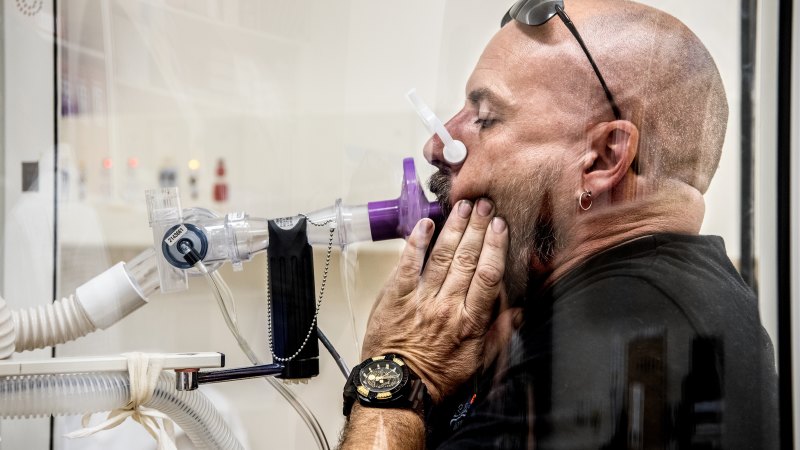Doctors who diagnose tradies with deadly silicosis face more than $8000 in fines if they fail to report the patient’s name and workplace to a new national registry that will track the disease fuelled by the popularity of engineered stone kitchen benchtops.
Draft legislation proposed by the federal government will force clinicians to hand over details within 30 days about stonemasons and other workers who contract the lung disease – caused by inhaling crystalline silica dust – including what is known about the circumstances of exposure.
A silicosis sufferer, 31-year-old Ken Parker, undergoes a lung function test at St Vincent’s Hospital in Sydney.Credit:Steven Siewert
But legislation will not be introduced until the second half of this year, despite the government facing backlash from within its own ranks and medical experts about the pace it is setting to combat the irreversible condition, which a Curtin University study predicted could be diagnosed in more than 100,000 Australian workers.
Assistant Health Minister Ged Kearney, who has backed moves to ban manufactured stone benchtops, said the registry was key to addressing respiratory conditions such as silicosis.
“We can’t act on what we don’t know, and this registry will enable a nationally co-ordinated response to cases so we can better protect workers,” she said.
According to a confidential draft bill and explanation released to stakeholders for feedback in November, the purpose of the national occupational dust diseases registry is to collect data to identify and monitor workplace silicosis risks, to end harmful exposure.
The draft legislation says diagnosing doctors face fines of up to $8250 if they breach the requirement to pass on certain information about the patient and their workplace – with or without the patient’s consent – to the Commonwealth.
However, after diagnosis, doctors who are treating patients are not obliged to pass on information, and consent must be sought before reporting broader but related information such as a patient’s history as a smoker.
The legislation is still being consulted on and will take in stakeholder feedback before being introduced. It will not need corresponding state-based legislation to take effect.
Dr Graeme Edwards, a former member of the national dust diseases taskforce who raised the alarm over rising silicosis cases in 2018, said the registry was long overdue after being proposed by the taskforce in 2019 and agreed to by the previous federal government in 2020.
Dr Graeme Edwards, one of the first clinicians to warn of the silicosis crisis in 2018, has criticised the pace of government action.Credit:Paul Harris
“We still do not have the enabling legislation in parliament to enable it to happen,” said Edwards, who previously labelled the combined inaction of governments as “tantamount to industrial manslaughter”.
“It’s about time they actually insisted on action, [and] create the legislative framework that enables it to happen – which is a political responsibility – and protect the workers of Australia.”
However, he said “draconian powers” to penalise diagnosing doctors for not reporting the condition could undermine the registry’s integrity because it could prompt clinicians to delay a diagnosis.
Lung Foundation chief executive Mark Brooke, whose organisation is writing the government’s national silicosis strategy, backed the mandatory reporting of all occupational lung diseases.
In a submission to the government on the draft legislation, the Australian Council of Trade Unions called for the mandatory reporting of occupational respiratory diseases to the register, and said the scope of recording patients’ exposure history was inadequate.
“Limiting to ‘last exposure’ as a mandatory field will inevitably miss and incorrectly attribute disease to the last exposure … all exposures are essential for any preventative action,” the submission said.
ACTU assistant secretary Liam O’Brien said the registry shouldn’t just be a notification system but also be of use to doctors and silicosis patients, so the progress of those on the registry could be tracked. He said the ACTU also wanted to see the registry up and running sooner.
Federal and state ministers last month agreed to commission Commonwealth agency Safe Work Australia to investigate a ban on engineered stone, prompting Edwards and some government MPs to speak out against the six months given to the federal body to report.
Safe Work has released a consultation paper proposing three options: the prohibition of all engineered stone; the prohibition of products containing more than 40 per cent silica; and the licensing of businesses using products with less than 40 per cent silica.
The first two options would also have licensing schemes for businesses exempt from the bans. Business groups have previously said they do not support a licensing scheme because it would heap regulatory burdens on various industries.
Cut through the noise of federal politics with news, views and expert analysis from Jacqueline Maley. Subscribers can sign up to our weekly Inside Politics newsletter here.
Most Viewed in Politics
From our partners
Source: Read Full Article


